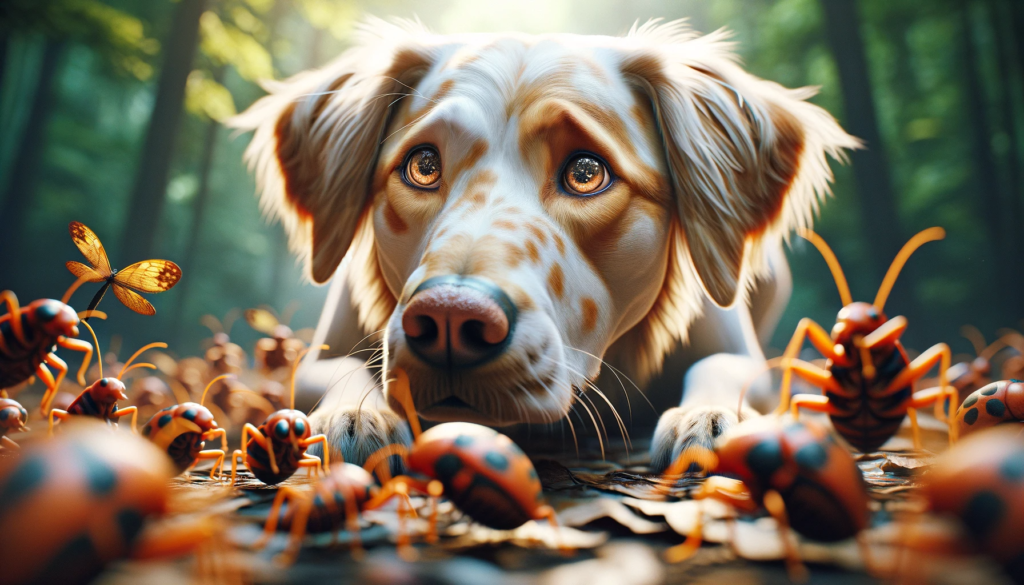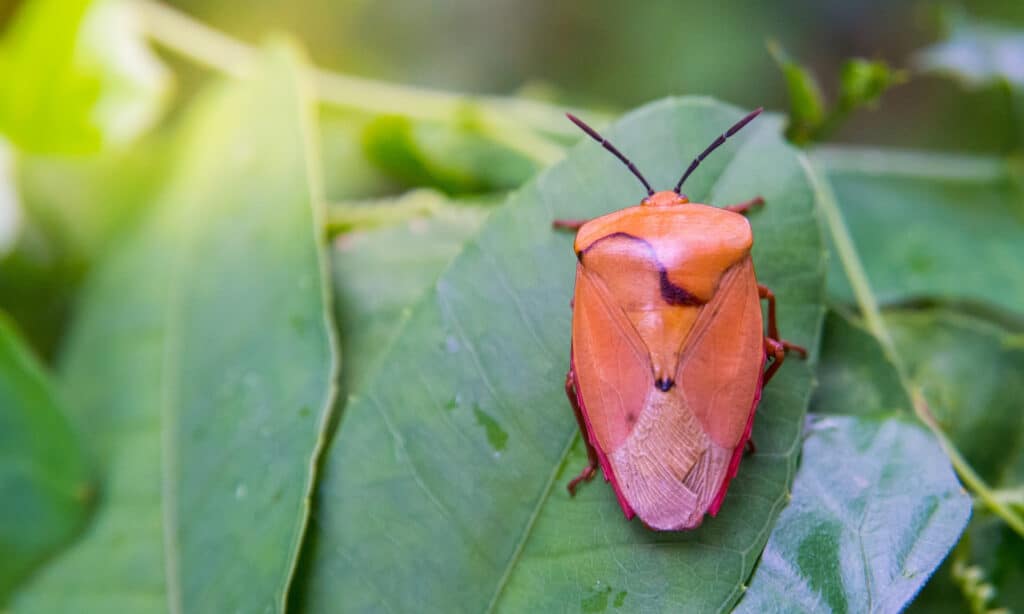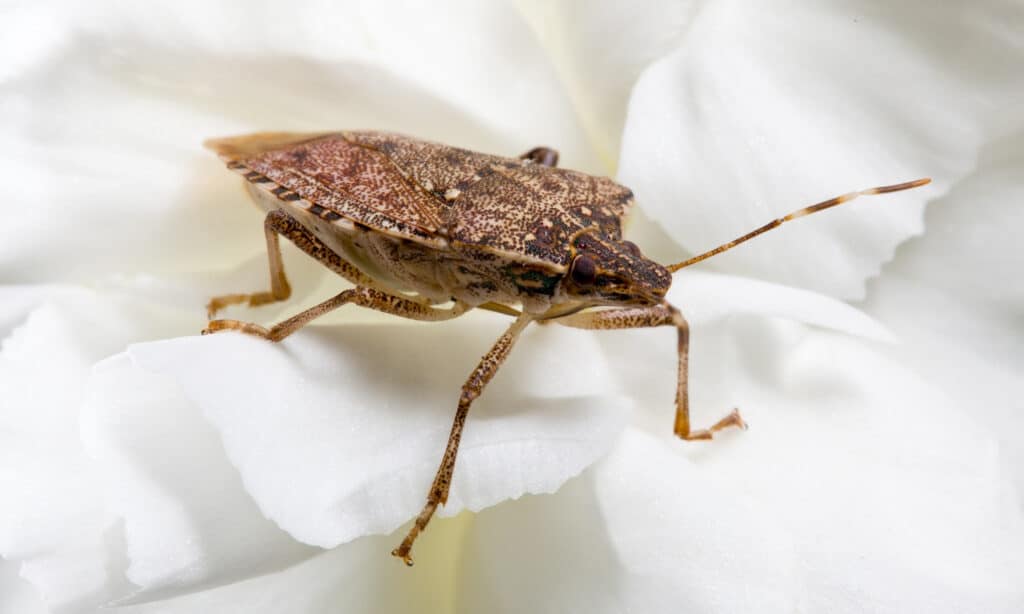If you’re a pet owner, you know how concerning it can be when your furry friend eats something they shouldn’t. In this blog post, we’ll be discussing a common scenario that many pet owners face – their dog eating a stink bug. We’ll answer the question of whether or not stink bugs are toxic to dogs. We’ll also explore why dogs may be inclined to eat them. And provide advice on what to do if your dog has consumed one. Moreover, we’ll discuss the potential symptoms to look out for and when it may be necessary to take your dog to the vet. Finally, we’ll offer some possible solutions for managing the aftermath of a stink bug ingestion. So, let’s dive in and put your worries at ease!

Are Stink Bugs Toxic To Dogs?
Pet owners may be relieved to know that stink bugs are not generally toxic to dogs. These insects emit a foul odor as their primary defense mechanism, which may be unpleasant for dogs but not harmful. In the rare instance that a dog ingests a stink bug, the likelihood of serious illness is low. However, as with any foreign substance ingested by a pet, it’s essential to keep a watchful eye on your dog for any signs of illness. Although stink bugs are not toxic, there is a possibility of mild gastrointestinal upset or other complications. Therefore, it’s crucial to monitor your dog’s behavior and seek veterinary advice if you notice any unusual symptoms after stink bug ingestion.
Why Would They Eat A Stink Bug?
Dogs are naturally inquisitive creatures, and their desire to explore their surroundings can sometimes lead them to eat unusual things. Stink bugs have a unique appearance and odor that can intrigue dogs, making them investigate and, in some cases, even eat the insects. Additionally, some dogs may find the smell of stink bugs appealing, which could increase the likelihood of consumption. Dogs that spend time outdoors are particularly susceptible to coming into contact with stink bugs. This can explain why they are more likely to eat them. While it may be unpleasant for pet owners to see their dog eating stink bugs. However, it’s a relatively harmless behavior, and most dogs will experience no ill effects from consuming the insects.

What To Do If Your Dog Eats A Stink Bug
If your dog has eaten a stink bug, there are a few things you can do to help minimize any potential negative effects. First, it’s important to remain calm and observe your dog for any signs of distress or unusual behavior. While stink bugs are not toxic to dogs, they may cause mild gastrointestinal upset or other complications in some cases. If your dog exhibits any concerning symptoms, such as vomiting or diarrhea, it’s best to contact your veterinarian for advice on how to proceed.
It’s also a good idea to thoroughly clean the area where your dog consumed the stink bug to prevent any lingering odors or attractants that could lead to further ingestion. Additionally, it’s helpful to keep your dog away from any areas where stink bugs are prevalent to avoid future consumption. If you’re concerned that your dog may continue to eat stink bugs or other insects. We’ll advice you to work with a trainer or behaviorist to address the behavior and prevent future incidents.
Symptoms To Watch For In Dogs
After a dog has eaten a stink bug, there are a few symptoms to watch out for that could indicate potential issues. The most common symptom associated with stink bug ingestion is mild gastrointestinal upset. This can include vomiting, diarrhea, or a decrease in appetite. Additionally, your dog may experience excessive drooling, nausea, or lethargy after consuming a stink bug. In some rare cases, dogs may also experience allergic reactions, which can manifest as hives, swelling, or difficulty breathing. If you notice any of these symptoms, it’s essential to contact your veterinarian for guidance on how to proceed.
It’s important to remember that not all dogs will exhibit symptoms after consuming a stink bug. However, if you do notice any changes in your dog’s behavior, it’s better to err on the side of caution and seek veterinary advice. Mild gastrointestinal upset can often be managed with at-home remedies such as bland diets and plenty of fluids. But it’s always best to consult with a professional to ensure the best possible outcome for your pet.

When To Take Your Dog To The Vet
If your dog has eaten a stink bug and is exhibiting concerning symptoms, it’s important to contact your veterinarian for guidance on how to proceed. In general, it’s best to take your dog to the vet if they are experiencing any severe or persistent symptoms. Such as vomiting or diarrhea that lasts for more than 24 hours, lethargy or weakness, loss of appetite, or any signs of dehydration.
Additionally, if your dog has a history of gastrointestinal issues or has eaten a large number of stink bugs, it’s wise to seek veterinary advice. While stink bugs are not toxic to dogs, excessive consumption can cause blockages or other complications that require medical attention. In some rare cases, dogs may have an allergic reaction to stink bugs. This can be life-threatening if not treated promptly.
If you’re unsure whether your dog needs veterinary care, it’s always best to contact your vet and describe your dog’s symptoms. They can help you determine whether your dog needs to be seen. The can also offer advice on how to manage any mild symptoms at home. Remember, when it comes to your pet’s health, it’s always better to err on the side of caution and seek professional advice when in doubt.
Possible Solutions For Your Dog Eating Stink Bugs
If your dog has a habit of eating stink bugs, there are a few possible solutions to help. The first step is to try to prevent your dog from coming into contact with stink bugs. This may involve limiting your dog’s access to areas where stink bugs are prevalent or supervising your dog more closely when outside.
Another solution is to work on training and behavior modification techniques to discourage your dog from eating stink bugs. This may include teaching your dog the “leave it” or “drop it” commands. Or you can use positive reinforcement to encourage desirable behaviors. Working with a professional trainer or behaviorist can be helpful in developing an effective plan for modifying your dog’s behavior.
If your dog continues to consume stink bugs despite your best efforts, it’s important to ensure that they are not ingesting other harmful substances or objects. It may be helpful to perform a thorough cleaning of your home and yard to remove any potential attractants or hazards. Additionally, you may consider using natural deterrents or repellents, such as essential oils or vinegar, to discourage your dog from eating stink bugs.
Insecticides or sprays are not recommended solutions. They can be toxic to your dog and other household members. It’s essential to prioritize your pet’s safety and well-being when considering any possible solutions for managing stink bug consumption.

Conclusion
In conclusion, while it’s not ideal for your dog to eat stink bugs, it’s generally not a cause for concern. Stink bugs are not toxic to dogs, but they can cause mild gastrointestinal upset or other complications in some cases. It’s important to keep an eye on your dog after they consume a stink bug and contact your veterinarian if you notice any concerning symptoms.
Preventing your dog from coming into contact with stink bugs as much as possible and working on behavior modification techniques can help manage the behavior of consuming stink bugs. Remember, insecticides or sprays are not recommended solutions. This is because they can be toxic to your dog and other household members. It’s important to prioritize your pet’s safety and well-being when considering any potential solutions for managing stink bug consumption.
While it can be alarming to discover that your dog has eaten a stink bug, most dogs will experience no lasting harm. With proper management and attention to your pet’s behavior and health, you can ensure that your dog stays safe and healthy, even in the face of curious canine behavior.
~Sheena
